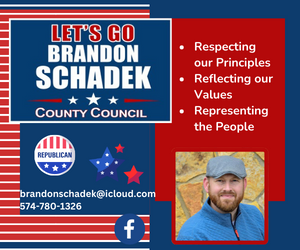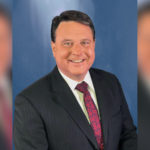 10/05/11 Washington Elementary Principal, Michele Riise, has spent the last 24 years in education, with 14 of those in administration roles. Now, in her eighth year as principal of Washington, she is taking on a whole new approach to elementary instruction using project-based learning. Riise said, “We need to teach our children 21st Century skills.” She indicated that the skills needed are not solely technology based, although technology does play a part in the process. She said, “Project-based learning is really showing students how to collaborate, research, and finalize a project just like people do in the “real” world.
10/05/11 Washington Elementary Principal, Michele Riise, has spent the last 24 years in education, with 14 of those in administration roles. Now, in her eighth year as principal of Washington, she is taking on a whole new approach to elementary instruction using project-based learning. Riise said, “We need to teach our children 21st Century skills.” She indicated that the skills needed are not solely technology based, although technology does play a part in the process. She said, “Project-based learning is really showing students how to collaborate, research, and finalize a project just like people do in the “real” world.
Riise said, “I’m pleased that the whole staff has been open to change.” The addition of project-based learning model is, in essence, a prelude to the type of instruction that will be offered full-time starting with the 2012-2013 school year at the Discovery Academy that will be in the Washington Elementary School building.
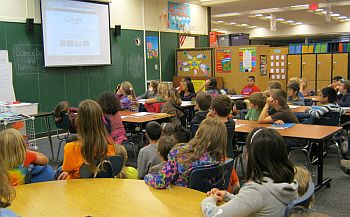 Currently, Washington Elementary houses 354 students plus a pre-school.
Currently, Washington Elementary houses 354 students plus a pre-school.
So far, students in kindergarten and 4th grade have already started their projects. Typically, the project work takes only a little over an hour of the school days when project-based learning is taking place. To make time for the projects, teachers have had to become extremely organized and creative with time management.
The students in the 4th grade classroom of Sue Jamriska begin their school work immediately upon entering the classroom. Projected on to a large screen is their assignments along with instructions on what they are expected to begin completing immediately. “Housekeeping” chores that used to consume precious instruction time has now been modified. In Jamriska’s class, for instance, students use a Popsicle stick with their name on it to indicate whether they are eating a hot lunch, a substitute lunch or eating a lunch that they brought from home. The sticks are placed in separate baskets to be counted.
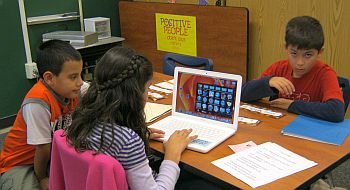 The project chosen by all of the 4th grade classes is to complete a brochure for the Marshall County Museum. Jamriska said, “The final brochure will be handed out at the museum.”
The project chosen by all of the 4th grade classes is to complete a brochure for the Marshall County Museum. Jamriska said, “The final brochure will be handed out at the museum.”
Groups of students are working together with each taking a different part of the overall project. Some are researching farming and transportation, while others are working on maps and regions. After the research is completed, each group of then “experts” will present their work to the larger group and, ultimately, the final components will be made into the brochure. Jamriska emphasized that the final vote using three different ideas will be made by the teachers.
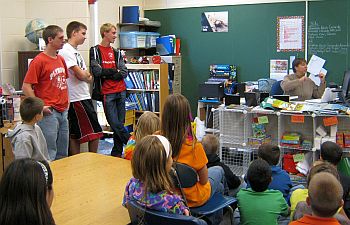 To help the students perfect the project, the teachers are using the resources of the community. So far, Plymouth High School Speech and Debate Coach/ teacher and Broadcasting teacher, David McKenzie, shared his expertise with all of the students so that they can present their ideas effectively. Also speaking to the students was Marshall County Museum Director Linda Rippy.
To help the students perfect the project, the teachers are using the resources of the community. So far, Plymouth High School Speech and Debate Coach/ teacher and Broadcasting teacher, David McKenzie, shared his expertise with all of the students so that they can present their ideas effectively. Also speaking to the students was Marshall County Museum Director Linda Rippy.
Plans are to introduce Janice Curtis, who is part of the technology staff of the Plymouth Schools, to the various groups next week. Curtis will be explaining how to use the programs in their computers design a brochure.
Jamriska said, “The kids love it and we (teachers) are all for it.” She added, “We want to include anything that’s going to enrich our kid’s education.”
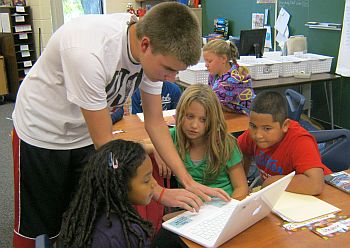 Chris VanVactor, also a 4th grade teacher, said,” The kids really do take ownership of their project.” She said, “It’ a different ways of learning. “ “We as teachers have to be on task the whole time when we are working with them.” Van Vactor has been teaching for 32 years and knows this type of instruction will take careful planning. She said, “We have to be really committed to this and keep it really exciting.” Jessica Ludwig is also a 4th grade teacher at Washington.
Chris VanVactor, also a 4th grade teacher, said,” The kids really do take ownership of their project.” She said, “It’ a different ways of learning. “ “We as teachers have to be on task the whole time when we are working with them.” Van Vactor has been teaching for 32 years and knows this type of instruction will take careful planning. She said, “We have to be really committed to this and keep it really exciting.” Jessica Ludwig is also a 4th grade teacher at Washington.
Jenifer George has 28 enthusiastic students in her kindergarten class who are happy to be a part of their all-kindergarten group project. Talking about community helpers is not new to a kindergarten curriculum, but the Washington kindergarteners are taking the learning one step further.
George said they began the project by taking the children on a walking tour of Plymouth is acquaint them with community helpers.
For now, they are concentrating on answering the question, “Who are you going to call?” As they delve into the subject more, they will be choosing a project that will be a help to the community. For now, they are separating into groups to learn how work done in a small group is then shown to a larger group.
To introduce the students to some community helpers they may not have encountered, George said they will have classroom visits by a horse trainer, veterinarian, and a pediatrician. The children will eventually hold a “job fair”.
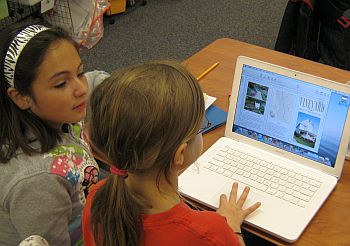 George said, “I love it (project based). It gives the children more choice and leads to more self exploration.” The classes of teachers Kendall Hoover and Candy Poor will also be involved in the kindergarten project.
George said, “I love it (project based). It gives the children more choice and leads to more self exploration.” The classes of teachers Kendall Hoover and Candy Poor will also be involved in the kindergarten project.
The 1st grade classes will be using a variety of methods to identify goods or services that they can produce to make a profit. Teacher Jenny Mevis said they will survey the students in their own school and then will survey another school using Skype or email.
Plans are to have local business owners evaluate ideas with the students. Lauren Cooper and Natasha Norris are first grade teachers at Washington and will be helping the students with the project.
The top three ideas that are validated by the surveys will be discussed and then one will be produced and sold at the completion of the project.
Mevis said next year, they could add a mini “Farmer’s Market”.
Kids in the second grade are learning about ecosystem and will complete a guidebook for the animals that live in and around the Yellow River. Bob Yoder, Marshall County Purdue Extension educator, and Mike Hite, Plymouth Park director, recently visited the second grade classrooms to speak on the topic.
The project was chosen as teachers were in training for project-based education this summer. Veteran teacher Alice Huff said, “In a lot of ways, we have used some project-based projects for many years.” However, she added, “This new project is more “authentic” since it is directed to a “real life” experience in the community.”
Huff, too, believes that students need to learn to be more cooperative and collaborative to acquire the skills for the 21st Century. Brooke Busse, also a second grade teacher, said, “We have just started out project, but I think it’s going to be wonderful experience.” Busse was a member of the forming committee for project-based instruction along with Riise, five other staff members, and three parents.
“This type of instruction seems more purposeful to students who are just beginning to question why they have to do certain things.” said fellow second grade teacher Teri Bair. The final hard cover book created by the students will be made available to the community.
Third grade teacher Elaine Hebert along with teachers Lisa Laidig and Deb Mellin will be focusing on sound travel with their students. Hebert said, “We will use the science principles of solids, liquids and gasses and the health effects of how sound can affect hearing.” They plan to have both the school nurse and a community audiologist speak to the students about the health issues and the school music teacher, Cindy Miller, teach about the origins of musical instruments.
Each student will end the four-week project period with an instrument that they have created.
Hebert said, “Our kick-off will begin with the students doing research.”
Riise said, “I could not ask for a more involved staff and I believe the project-based instruction will be beneficial.”
Carol Anders Correspondent









